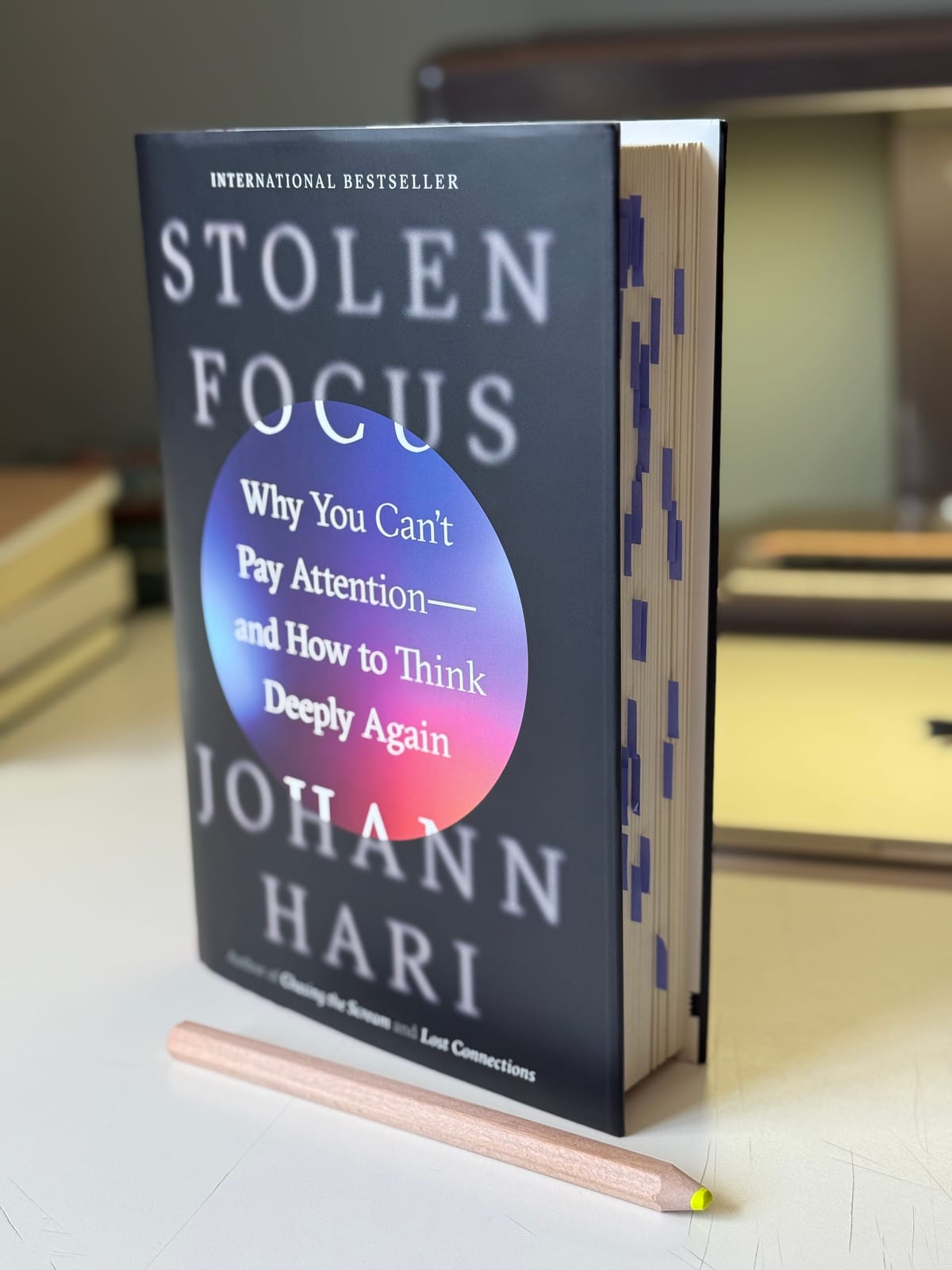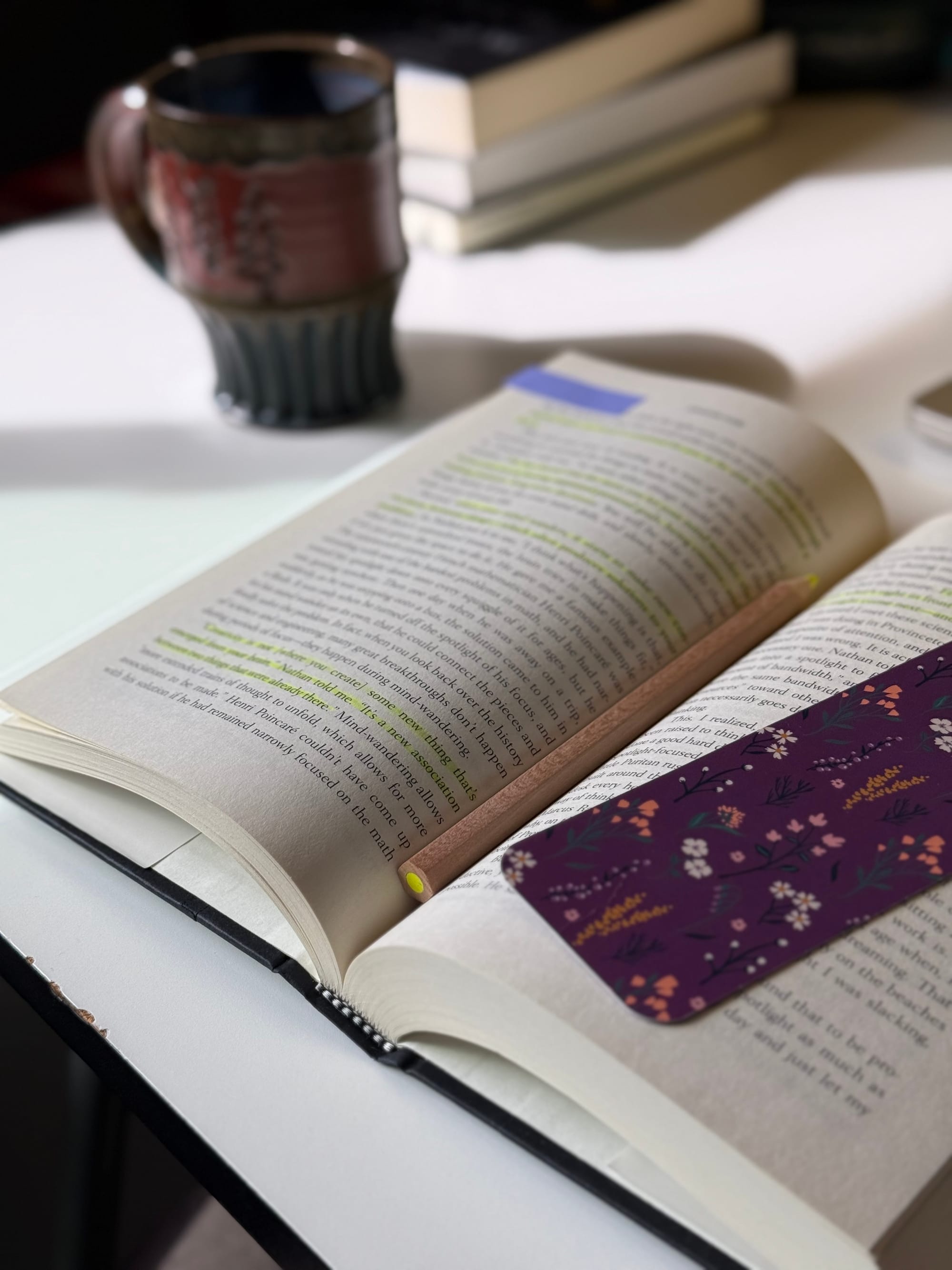Book Review: Stolen Focus by Johann Hari
A startling look at why we can’t pay attention and how to think deeply again.

This book couldn’t have come at a better time.
I’ve been having trouble focusing for the last couple of months. It could be attributed to any number of things: the extra doomscrolling I’ve been doing since November; that my brain is still recovering from my daughter’s infant stage where she and I were awake a couple times a night; or that I’ve been using revenge procrastination to reclaim a few extra hours to myself before I go to bed, mindlessly scrolling and avoiding having to go to sleep. And that’s just a few of the things affecting my attention.
Subconsciously I knew that this has been troubling me for a while. So when I saw this book, I knew it was going to be impactful.
First Impressions
The author, Johann Hari, dives deep into all of the things that are distracting us on a daily basis: not just smartphones and social media, but tons of other things that are affecting our ability to focus.
- Switching and filtering: Switching between tasks makes us slower, less creative, more prone to making mistakes, and able to remember less of what we do. “We use our phones so habitually that I don’t think we consider doing a task and checking our phones at the same time as multitasking […] Simply having your phone switched on and receiving texts every ten minutes while you try to work is itself a form of switching.”
- Crippling of flow states: The loss of one of the deepest forms of focus and attention that we know of, where time seems to pass without notice and we "are flowing into the experience itself.” Distraction and multitasking easily disrupts and kills the flow state.
- Collapse of sustained reading: 57% of Americans do not read a single book in a typical year. One of the most common forms of flow is reading a book, and unfortunately it is being bombarded by daily distractions.
- Rise of surveillance capitalism: Companies like Facebook and Google have vested interests in keeping you looking at your screens for long periods of the day. “Every time you send a message or status update on Facebook, or Snapchat, or Twitter, and every time you search for something on Google, everything you say is being scanned and sorted and stored. These companies are building up a profile of you, to sell to advertisers who want to target you.”
- The surge in stress: Many sorts of stress are compounding on our ability to pay attention, be it financial stressors, our political climate, our increasing workloads, and so much more. “A more stressed society will be less able to resist distractions.”
- Deteriorating diets and rising pollution: There’s been a dramatic increase in processed foods in our diets. Sadly, they are much more accessible in price and availability than the healthier, whole food options that actually help us concentrate. Combine that with exposure to pollution and industrial chemicals—in the air and in the products we buy–our environment is doing a number on our bodies and our attention span.
These are just tiny glimpses of the research and topics written about in this book. There’s so much more that I just don’t have the space here to dive into. It’s a fascinating look at many things that affect our focus and attention.
Taking Action
I knew within the first couple of chapters that this would have an impact on me. While a good portion of this book talks about how we need systemic change to make a real difference (which I completely agree with), I also wanted to make some individual changes in my own life that hopefully will stick.
1. I quit Google Search.
I already knew that Google was doing some heavy tracking on what I’ve searched and has likely used it to fuel the ads I see, but I got an immediate ick when it was laid out for me. Bye, Google. I switched to DuckDuckGo, a browser and search engine that puts privacy above all else.
2. I deleted my Reddit account.
Reddit was just another rabbit hole for my brain to go down when it was bored. Reddit is also a huge source of doom stress for me, so out it goes.
3. I deleted my personal Instagram profile.
My personal Instagram profile was already on its way out, since last year I decided to stop sharing personal family photos (especially of my kids) on the internet. I also don’t love getting blasted by ads between every valuable post. I connected with those I follow, swapped phone numbers and emails, and deleted the account.
4. I am taking a break from Bookstagram.
For a few weeks to a month, I’ll be away from Bookstagram to focus more on reading more books less on making social media content. I also found that I was scrolling a lot more lately, so this feels like a natural step to take.
Overall, I need to approach social media more as a tool that I can use to share my books and reviews, and to talk about books occasionally with people. I can’t live there, mindlessly scrolling. If I’m not reading as much as I want to be, then I need to figure out a solution.

Final Thoughts: Should You Read It?
I’d rate Stolen Focus ★★★★★ (5/5 stars).
- Valuable in a way where it makes you look closer at your own attention span.
- A medium-paced book with great interviews, research, and personal anecdotes.
- Validated a lot of the concerns I had about my phone usage.
I highly recommend getting the physical copy of this one. I typically read a lot of books as ebooks (on my phone), but this subject forced me to recognize that reading books on my phone can be very distracting for me. I’m switching to other apps, checking my email, reading a text, refreshing Reddit, going back to my book… it’s a wonder that I absorb any of my ebooks at all. I know reading books on phones works for some people, but I think I need to pull myself back from social media before I can read more on my phone.
This book doesn’t provide a ton of answers, but does recognize that things need to change at a systemic level if we want to reclaim any of our attention. Individual changes are good and worthwhile, but that’s not going to stop Facebook from making money off your clicks. That’s not going to slow down the number of ads you face on a daily basis.
We need to build a movement to bring wider attention to the problem most of us face, and demand the ban of surveillance capitalism. Meanwhile, look critically at our own focus and take steps to claw back the attention taken from us.
“… This is a fight ‘about personal liberation’– about ‘liberating ourselves from people who are controlling our minds without our consent.’”
How’s your attention? Do you ever feel pulled in twenty directions at once and have difficulty getting anything done? Share your thoughts below.
Book Summary
- Title: Stolen Focus
- Author: Johann Hari
- Genre: Self-Help, Non-fiction, Psychology, Personal Development
- Who Should Read It? Everybody. At least, anybody with a smartphone and spends too much time on it.
Synopsis: In the United States, teenagers can focus on one task for only sixty-five seconds at a time, and office workers average only three minutes. Like so many of us, Johann Hari was finding that constantly switching from device to device and tab to tab was a diminishing and depressing way to live. He tried all sorts of self-help solutions—even abandoning his phone for three months—but nothing seemed to work. So Hari went on an epic journey across the world to interview the leading experts on human attention—and he discovered that everything we think we know about this crisis is wrong.
We think our inability to focus is a personal failure to exert enough willpower over our devices. The truth is even more disturbing: our focus has been stolen by powerful external forces that have left us uniquely vulnerable to corporations determined to raid our attention for profit. Hari found that there are twelve deep causes of this crisis, from the decline of mind-wandering to rising pollution, all of which have robbed some of our attention. In Stolen Focus, he introduces readers to Silicon Valley dissidents who learned to hack human attention, and veterinarians who diagnose dogs with ADHD. He explores a favela in Rio de Janeiro where everyone lost their attention in a particularly surreal way, and an office in New Zealand that discovered a remarkable technique to restore workers’ productivity.
Crucially, Hari learned how we can reclaim our focus—as individuals, and as a society—if we are determined to fight for it. Stolen Focus will transform the debate about attention and finally show us how to get it back.